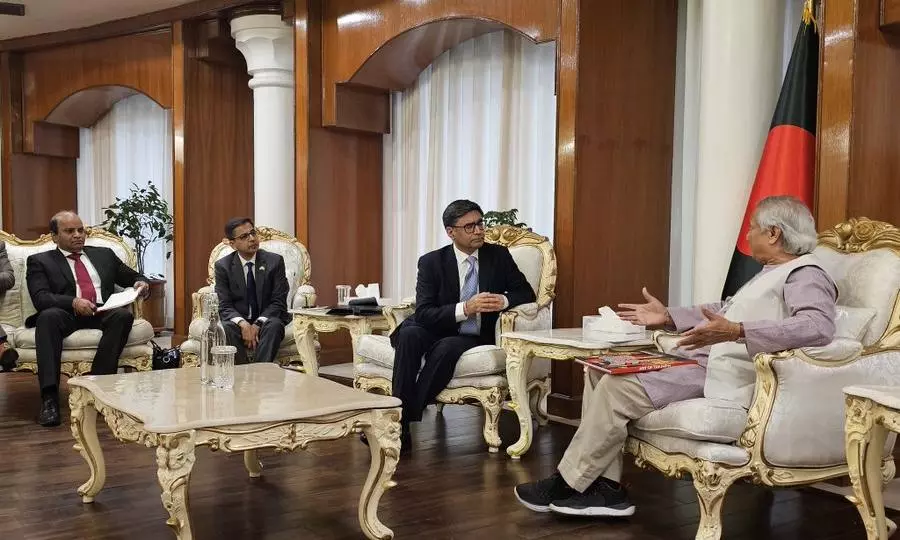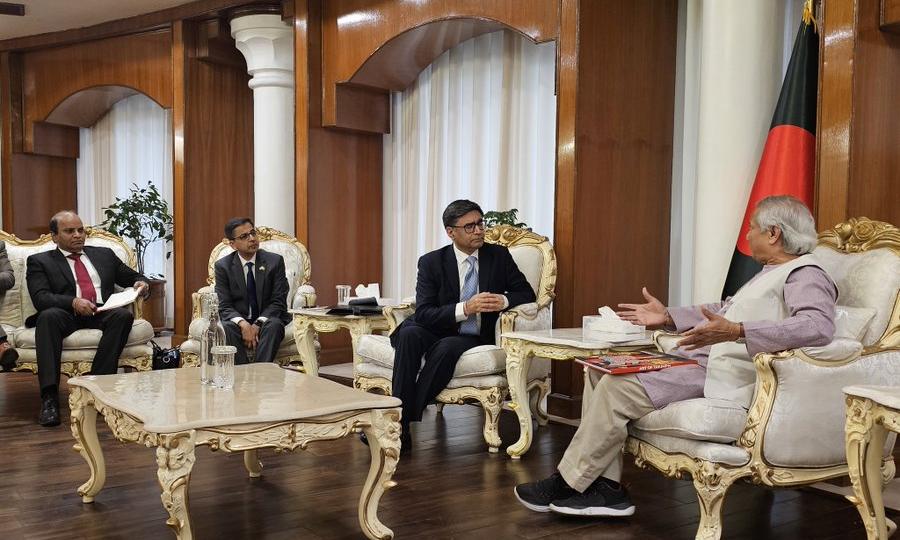
New Delhi: Foreign secretary Vikram Misri on Monday held consultations in Dhaka with Bangladesh foreign secretary Mohammad Jashimuddin during his day-long visit to the volatile neighbouring country amid rising bilateral tensions. Misri stressed that “India desires a positive, constructive, and mutually beneficial relationship with Bangladesh”.
However, the foreign secretary also conveyed India’s concerns “including those related to the safety and welfare of minorities” after the relentless attacks by radicals on Hindus there. He also discussed some regrettable incidents of attacks on cultural, religious, and diplomatic properties, including the recent breach by protesters of the premises of the Bangladesh mission in Agartala.
In a statement issued in the evening, New Delhi said Misri “reiterated India’s willingness to build a positive and constructive relationship with Bangladesh, based on mutual trust and respect and mutual sensitivity to each other’s concerns and interests” while “highlighting India’s support for a democratic, stable, peaceful, progressive and inclusive Bangladesh”.
During the talks, “both sides held comprehensive discussions on a wide range of issues, covering political and security matters, border management, trade, commerce and connectivity, cooperation in water, power and energy sectors, development cooperation, consular, cultural and people-to-people ties”, New Delhi said, adding: “They also exchanged views on sub-regional, regional and multilateral issues, and agreed to enhance consultations and cooperation to advance regional integration, including under the Bimstec framework”.
Bangladesh foreign secretary Mohammad Jashimuddin was cited as saying after the talks with Misri that “Bangladesh government is committed to ensuring the safety and security of the people of Bangladesh irrespective of their faiths, religions and ethnicities and that it is an internal matter of Bangladesh”.
According to reports citing an official statement issued by Dhaka, the Bangladesh foreign secretary told Misri that “the issue of border killings undermines the spirit of friendly relations between the two neighbours and immediate resolution of the issue would significantly contribute to building necessary trust and confidence among the people of Bangladesh”. He also raised the issue of recent breach of the Bangladesh mission in Agartala. According to the cited statement, Jashimuddin wanted India to bring its visa services in Bangladesh back to normal.
During his visit, the foreign secretary also called on the chief adviser of the interim government (equivalent to Prime Minister) Muhammad Yunus and the foreign adviser (foreign minister) Touhid Hossain.
Reminding Bangladesh that both nations have a “mutually beneficial engagement on a whole set of issues, ranging from trade, commerce, connectivity, power, water, and energy, and development cooperation, consular cooperation and cultural cooperation”, Misri said “there is no reason why this mutually beneficial cooperation should not continue to deliver in the interests of both our peoples”.
Later, Misri told the media that India “expects, overall, a constructive approach on all these issues by the Bangladesh authorities, and we look forward to moving the relationship forward in a positive, forward-looking, and constructive direction”.
This visit is taking place amid bilateral tensions after the ouster of Sheikh Hasina as Prime Minister in Dhaka four months ago, as the interim government led by Nobel laureate Muhammed Yunus is seen to be taking an anti-India stand and targeting Hindu organisations while looking the other way when religious fundamentalists are attacking Hindu temples and looting the properties of Hindus there.
In a statement to the Bangladesh media after the talks, Misri said: “I am here in Dhaka at the invitation of my Bangladesh colleague, Mohammad Jashimuddin, the foreign secretary of Bangladesh, for discussions and consultations on the entire gamut of issues… Since the political changes in Bangladesh in August this year, there has of course been contact between our leaderships… Today’s discussions have given both of us the opportunity to take stock of our relations, and I appreciate the opportunity today to have had a frank, candid, and constructive exchange of views with all my interlocutors… We have seen in the past, and we continue to see in the future, this relationship as a people-centric and people-oriented relationship, one that has the benefit of all the people as its central motivational force.”
He added: “We had the opportunity to discuss certain recent developments and issues, and I conveyed our concerns, including those related to the safety and welfare of minorities. We also discussed some regrettable incidents of attacks on cultural, religious, and diplomatic properties… We look forward to moving the relationship forward in a positive, forward-looking, and constructive direction.”
Meanwhile, Bangladesh’s former prime minister Sheikh Hasina, who fled to India in August this year after being deposed, launched yet another attack on the Yunus-led interim government in Dhaka and described it as “fascist”. Speaking at an overseas event in virtual mode, Hasina was quoted as saying: “This darkness will end, and the fascist, murderous, conspiratorial Yunus government will learn a lesson from the people of Bangladesh. They are destroying our country, and they have created terror there. Please unite and remove this fascist government so that Bangladesh’s future can be secure… Now, who will you seek justice from? Anyone can enter your home and steal everything. They are filing false cases and releasing those who have killed people. Why did they loot the rooms of MPs and the Parliament building? They are looting the country. Why are they destroying the economy? Why are they doing this? Murderer Yunus and his advisers will have to answer for this.”
She added: “They (Yunus-led government) have tortured and assaulted religious minorities in Bangladesh. They attacked religious sites as well, including temples and churches. Several Awami League leaders have been killed… They have arrested Chinmoy Krishna Prabhu and have not allowed a lawyer for him… Yunus designed the conspiracy against our government. He accepted hatching the conspiracy. He was the mastermind… We accepted their demands, but still, Yunus did all this to rule Bangladesh… I have not handed over the government, but it was occupied by the Yunus-led protesters. I fled the country as I never wanted to do politics on dead bodies.”
